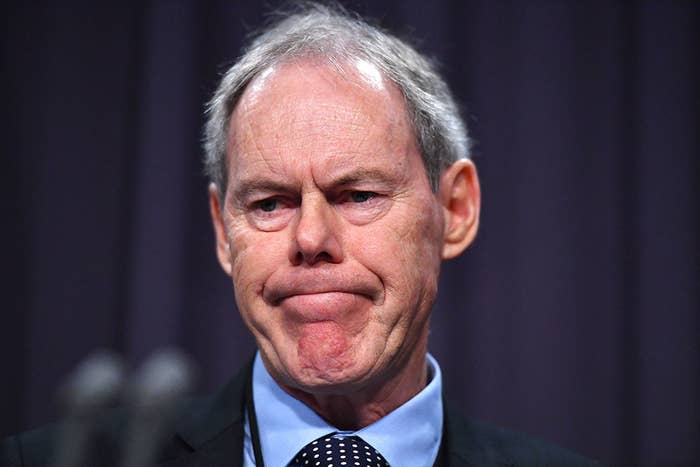The boss of Australia's charity regulator has refused to back down from his earlier description of Aboriginal women as "cash cows", while claiming that including an acknowledgement of country in his email signature would make him seem biased.

Appearing before Senate Estimates on Wednesday evening, the head of the Australian Charities and Not-for-profits Commission (ACNC), Gary Johns, was questioned about his recent decision to remove the acknowledgement of country from the commission's email signatures.
Until a few months ago, his own signature and that of some of his staff had included an acknowledgement of country, beginning with "we acknowledge the elders". The practice of acknowledging country is common across the public service.
Johns said he was trying to avoid looking biased, as the commission oversees both Indigenous and non-indigenous charities and he is a "commissioner for all charities".
"It worried me, the term 'we acknowledge', because it refers to the commission," he said. "I took the view that ... using the words 'we acknowledge' imply that the entire commission was, if you like, acknowledging one group of charities and not others," he said.
"The words raise the perception of bias that I'm not treating all charities the same," he said. "I think that's plain on the face of it."
Johns raised the issue with ACNC staff whose signatures contained an acknowledgement of country, but left them the option of changing "we acknowledge" to "I acknowledge". One staff member objected, and Johns says he took no disciplinary action against her.
Labor senator Jenny McAllister said to Johns that the acknowledgement "doesn't in any way speak about charities ... Traditional owners are not charities". Johns said that it "refers to Indigenous people", and McAllister replied that Indigenous people were "people and citizens", not charities.
"To be an Indigenous charity, you need a number of Indigenous people on the board, so to all intents and purposes they are," Johns replied, pointing to the charitable purposes of organisations such as Reconciliation Australia, which he said only apply to Indigenous people.
Senator @jennymcallister asks the charities commissioner whether he's disavowed his comments that Aboriginal women on welfare are "cash cows". "Absolutely not". https://t.co/nj6kBTeOqi
Johns' appointment to ACNC commissioner in December 2017 was controversial, partly because of his public stance on Indigenous issues.
In a 2015 appearance on The Bolt Report Johns said that Aboriginal women were "used as cash cows. They are kept pregnant and producing children for the cash". He has argued that women on welfare should have to take contraception. He has also criticised Indigenous not-for-profits, describing Recognise, an organisation that campaigned to raise awareness and support for constitutional recognition of Australia's First Peoples, as "the officially sanctioned propaganda arm of the Australian Government" in his 2014 book The Charity Ball.
In his estimates appearance Johns said he had "absolutely not" disavowed those views. "I'm quite public," he said in response to questioning from McAllister. "I've written for 30 years about a whole range of matters. Why would I seek to disavow any of that?"
McAllister asked whether he had done anything to "dispel any perception of bias" that his previous comments might have created.
"No, and I don't need to as the commissioner," he replied.
McAllister suggested that Johns' earlier remarks were "fairly more directly relevant" to his role than the acknowledgement of country, because they "go very directly to the charitable purposes of the organisations that you regulate".
"They're not in my signature block," Johns replied. "That's the issue."
"You raised perceptions and biases as your reason for changing this practice which is widespread in other parts of the Australian public service," McAllister had said earlier.
"You've written extensively with very strong and, I would suggest, unorthodox opinions about Aboriginal affairs publicly prior to taking this role. Some people might conclude that in fact you are importing your own preferences into the institutions of the Australian public service. Do you have a response to that?"
Johns replied: "That’s wrong, because I'm only discussing the issue of perception of bias and not the substance of the issue."
Shadow minister for charities and not-for-profits Andrew Leigh, who previously started a petition calling on Johns to resign, said it was "disappointing" that Johns had "publicly confirmed during a parliamentary hearing in his role as the charities commissioner that he still holds these opinions". He described Johns as "drastically out of touch with the Australian community".
"What remains to be heard is [the government's] explanation of how he can possibly remain [at the ACNC] given his comments," Leigh said.
UPDATE
In Senate Estimates on Friday, Minister for Indigenous affairs Nigel Scullion was questioned about Johns' comments earlier in the week.
Scullion said he would provide a detailed response to McAllister's questions later, as he was not familiar with the exchange and did not have a transcript of it.
However, he said he would "in a broad, broad sense" share McAllister's concerns about Johns' position on including the acknowledgement of country in his email signature, and that he could see "no reason" why it would indicate bias.
"I understand why people at the bottom of an email block would put either an acknowledgement of country - there are a variety of things that occur within those blocks and I support those, of course," he said.
"I would appreciate you taking this matter in hand, because we've got a government appointment of a person whose views about Indigenous people are, in my view offensive," McAllister said.
"He was given the opportunity to step away from them or explain how he does not allow them to influence his administration at the charities and the regulation of the charities sector. He flatly refused to repudiate these views or to even distance himself from them in any way in the exchange. I think it goes to a very serious problem in administration in the charities sector and one that ought to concern you as Indigenous affairs minister."
